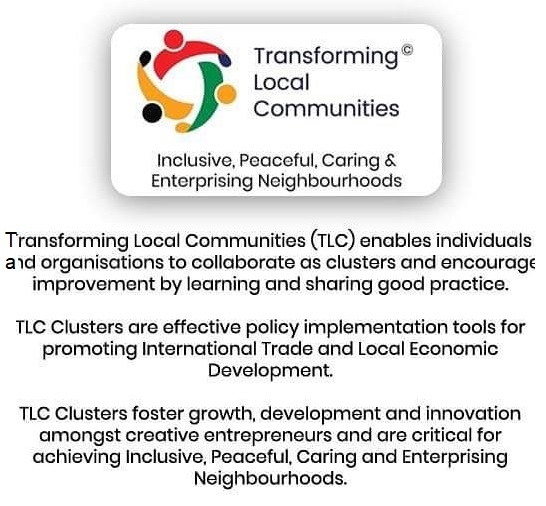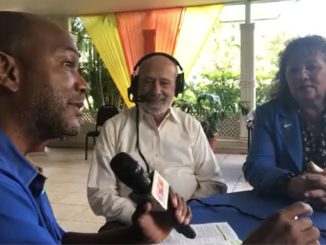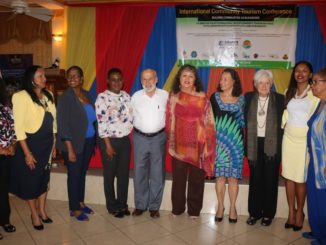
Community Tourism Hospitality Entrepreneurship Training Programme From The Academy For Community Tourism (Act) In Partnership With The Uwi Open Campus
 UWI OPEN CAMPUS in partnership with the Academy for Community Tourism (ACT) see communities as destinations and community tourism as the vehicle for sustainable development and prosperity. In a heavily tourism-dependent region in the world, every community and citizen is a potential business partner to be trained in hospitality skills, entrepreneurship, environmental awareness, product development and marketing. But to become an effective partner, every community and every citizen needs to understand how to value their natural, cultural, heritage and human assets and add value to them through conservation, creativity, education and collaborative management.
UWI OPEN CAMPUS in partnership with the Academy for Community Tourism (ACT) see communities as destinations and community tourism as the vehicle for sustainable development and prosperity. In a heavily tourism-dependent region in the world, every community and citizen is a potential business partner to be trained in hospitality skills, entrepreneurship, environmental awareness, product development and marketing. But to become an effective partner, every community and every citizen needs to understand how to value their natural, cultural, heritage and human assets and add value to them through conservation, creativity, education and collaborative management.
The University of the West Indies (UWI) Open Campus is one of the four campuses that make up the pillars of The UWI, which was established in 1948. The institutionally accredited UWI serves the people of the region by offering undergraduate and postgraduate, distance and continuing educational products, research, innovation and outreach services from all of its locations across the Caribbean region.
The Academy for Community Tourism (ACT) mission is: “Develop future hospitality leaders through education and practical training while fostering goodwill and friendship.”
The training will be implemented directly in each community for 20-30 persons at a cost of US$2500 for 5 days from 9:00 am – 1:00 pm each day. In addition, there is a subsistence charge of US$1500 per course to cover meals, transportation and accommodation to cover two Lead Training Consultants. Total required for each community is estimated at US$4000.00.
CONSULTANT IMPLEMENTATION TEAM FOR THE UWI OPEN CAMPUS (JAMAICA) COMMUNITY TOURISM HOSPITALITY ENTREPRENEURSHIP TRAINING
Levene Griffiths, Head, UWI Open Campus , Jamaica Eastern
Diana McIntyre-Pike, OD, BSc.: Community Tourism & Hospitality Skills and Community Development
Alison Kenning Massa, MA, MS, Dipl. Social Administration: Community Tourism, Economic Development, Environmental Sustainability
Valerie C. Dixon, MBA: Cultural Heritage, Business Planning
COURSE DESCRIPTION The Community Hospitality Entrepreneurship Programme will introduce participants to Community Tourism, and the practical steps required to build hospitality products & services within their community, utilizing the community destination brand, geared to both domestic and international visitors. During the programme, participants will identify unique community assets (heritage, culture, attractions), and through a highly interactive approach build the starting components for setting up their community-based brand and business, by utilizing the business model canvas. Community participants agree on next steps and begin steps to implement their project.
LEARNING OBJECTIVES At the end of the programme participants should be able to:
Define tourism and its importance
Identify the economic linkages generated by tourism
Understand the benefits of tourism
Define Community Tourism
Identify the main principles and values of community tourism
Identify what is a community tourism experience
Identify community tourism assets
Identify the importance of protecting community assets
Appreciate the value of authenticity in community assets
Know the difference between genuine hospitality and artificial hospitality.
List the hospitality services required by visitors
Identify how the community can participate to satisfy these needs
Evaluate suitability of current community services to visitor needs
List requirements and services for setting up a Home Stay as a case study for servicing visitors
Build an outline of a community tourism Home Stay experience
. Determine community tourism experiences possible in host community
List the basic requirements for setting up a community tourism business based on understanding visitor needs
Define what is a cluster
Identify the networking opportunities in meeting requirements of setting up a community tourism business.
Identify Potential Community Tourism Projects
Create a community tourism experience value proposition based on the value proposition canvas and identified community assets to be utilized.
Write a value proposition
Understand the components of a business model
Identify customer segments for community tourism value proposition
Identify customer relationships and customer channels for targeted customers
Identify best-fit pricing and income streams
Identify key activities required to service targeted customers
Identify key resources required Identify key strategic partnerships required to deliver value proposition to customers
Identify key costs/expenses
Identify a business model for the a community tourism experience and/or product
FOR FURTHER INFORMATION, PLEASE CONTACT:
DIANA MCINTYRE-PIKE, LEAD TRAINER/CONSULTANT
ACADEMY FOR COMMUNITY TOURISM (ACT)
TEL: 876-507-6326 Caribbean@peacetourism.org
Skype: villagescctn



